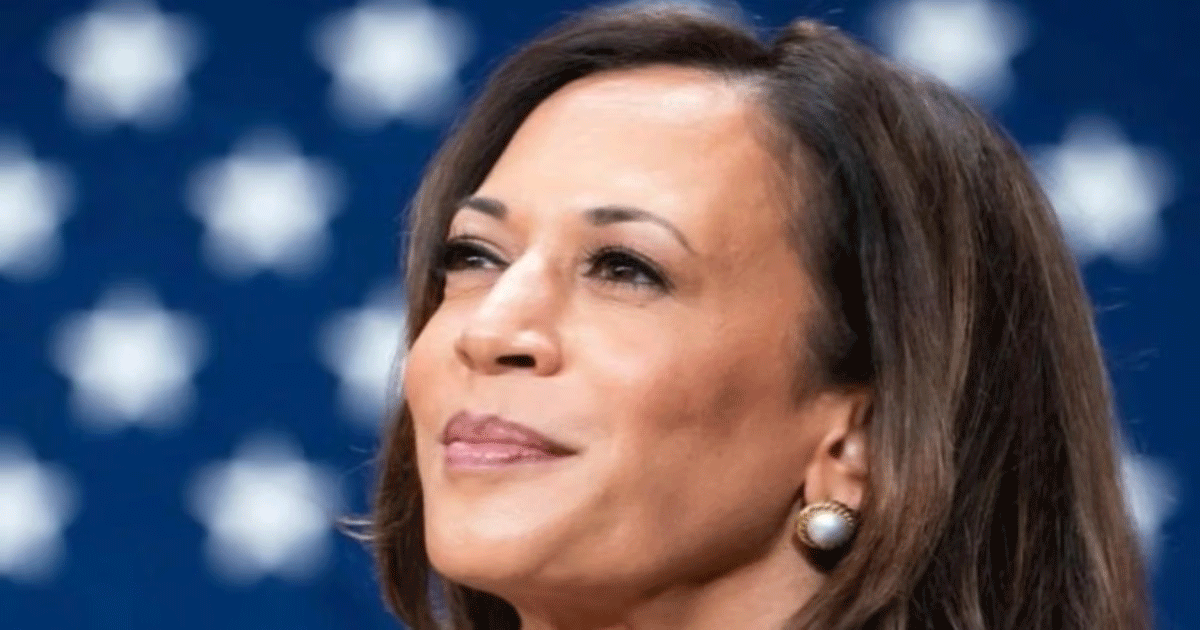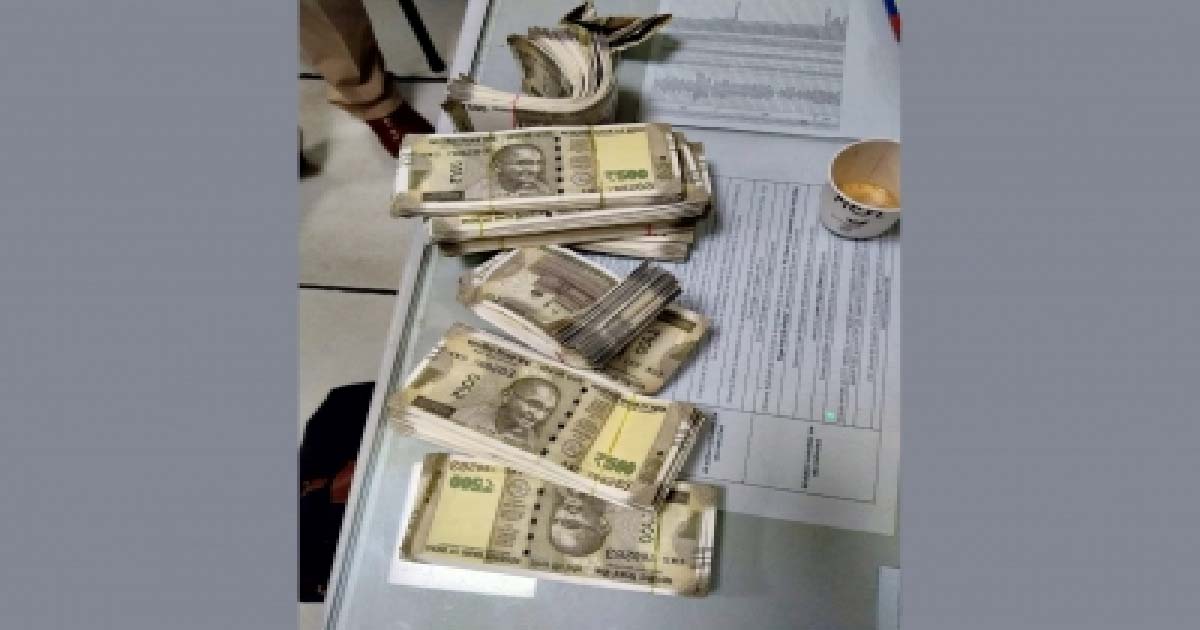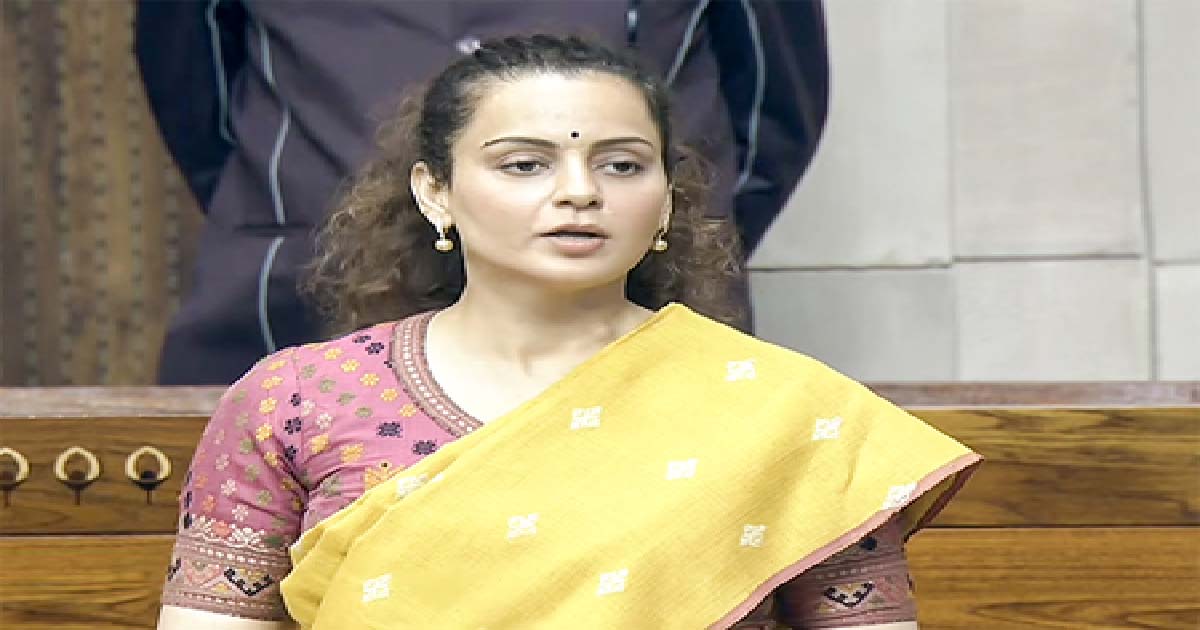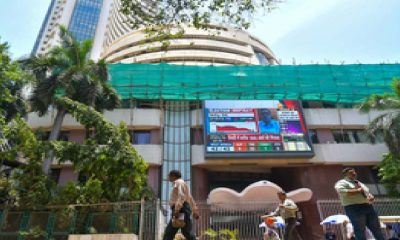International News
‘My Heart Is Full Today’: US VP Harris After Conceding Defeat

US Vice President Kamala Harris while addressing supporters at Howard University appeared emotional at her loss, but expressed hope for the betterment of the country.
Donald Trump won a second term in office in the presidential polls. He surpassed the 270-majority mark with a key win in Wisconsin.
Harris expressed hope and said that the light of the US’s promise would burn bright as long as people kept fighting.
“My heart is full today, full of gratitude for the trust you have placed in me, full of love for our country, and full of resolve. The outcome of this election is not what we wanted, not what we fought for, not what we voted for. But hear me when I say, the light of America’s promise will always burn bright as long as we never give up and as long as we keep fighting,” she said.
Harris thanked her husband, Douglas Emhoff, Second Gentleman of the United States, US President Joe Biden and his family, her running mate Tim Walz and the entire team for their support.
“To my beloved Doug and our family, I love you so very much. To President Biden and Dr Biden, thank you for your faith and support. To Governor Walz and the Walz family, I know your service to our nation will continue. And to my extraordinary team, to the volunteers who gave so much of themselves, to the poll workers and the local election officials. I thank you all,” she said.
Choking back her tears, Harris said that she was proud of the way the team ran for the race over the course of the campaign period. She said that the campaign was a reminder of the fact that there was a lot more in common among them than what separated them.
“I am so proud of the race we ran and the way we ran it. Over the 107 days of this campaign, we have been intentional about building community and building coalitions, bringing people together from every walk of life and background, by the love of country, with enthusiasm and joy in our fight for America’s future. And we did it with the knowledge that we all have so much more in common than what separates us. Now, I know folks are feeling and experiencing a range of emotions right now. I get it. But we must accept the results of this election,” she said.
Harris added that she spoke to President-elect Donald Trump and congratulated him on his win. She added that what distinguishes a democracy from tyranny or monarchy is to accept the election result.
“Earlier today, I spoke with President-elect Trump and congratulated him on his victory. I also told him that we will help him and his team with their transition, and that we will engage in a peaceful transfer of power. A fundamental principle of American democracy is that when we lose an election, we accept the results. That principle, as much as any other, distinguishes democracy from monarchy or tyranny. And anyone who seeks the public trust must honour it. At the same time, in our nation, we owe loyalty not to a president or a party, but to the Constitution of the United States, and loyalty to our conscience and to our God. My allegiance to all three is why I am here to say, while I concede this election, I do not concede the fight that fuelled this campaign,” she said.
Harris said that the fight that she won’t give up is a fight to reflect the US at its best. She subtly hinted at the controversial abortion ban, the overturning of which was a part of her campaign and said that her fight would continue for women’s rights over their bodies.
“The fight for freedom, for opportunity, for fairness, and the dignity of all people. A fight for the ideals at the heart of our nation. The ideals that reflect America at our best. That is a fight I will never give up. I will never give up the fight for a future where Americans can pursue their dreams, ambitions, and aspirations. Where the women of America have the freedom to make decisions about their own body and not have their government telling them what to do. We will never give up the fight to protect our schools and our streets from gun violence. America, we will never give up the fight for our democracy, for the rule of law, for equal justice, and for the sacred idea that every one of us, no matter who we are or where we start out, has certain fundamental rights and freedoms that must be respected and upheld,” she said.
Harris added that her fight would continue everywhere. Subtly hinting at Trump’s policy of ‘sealing the borders’, said that the fight also includes acceptance of strangers as neighbours.
“We will continue to wage this fight in the voting booth, in the courts, and in the public square. And we will also wage it in quieter ways, in how we live our lives, by treating one another with kindness and respect, by looking in the face of a stranger and seeing a neighbour, by always using our strength to lift people up, to fight for the dignity that all people deserve,” she said.
Harris added that the fight for such freedom requires hard work, but it is always worth it.
“The fight for our freedom will take hard work, but like I always say, we like hard work. Hard work is good work. Hard work can be joyful work. And the fight for our country is always worth it. It is always worth it,” she said.
Addressing the young voters, which was Harris’s trump card, she said that the fight wasn’t over yet, and it was time to roll sleeves up, and not give up.
“To the young people who are watching, it is okay to feel sad and disappointed. But please know it’s going to be okay. On the campaign, I would often say, when we fight, we win. But here’s the thing, here’s the thing. Sometimes the fight takes a while. That doesn’t mean we won’t win. The important thing is don’t ever give up.
Don’t ever stop trying to make the world a better place. You have power. And don’t you ever listen when anyone tells you something is impossible because it has never been done before. You have the capacity to do extraordinary good in the world. And so to everyone who is watching, do not despair. This is not a time to throw up our hands. This is a time to roll up our sleeves. This is a time to organize, to mobilize, and to stay engaged for the sake of freedom and justice and the future that we all know we can build together,” she said.
Harris motivated people by asking them to find light within themselves and draw strength.
“Look, many of you know I started out as a prosecutor and throughout my career I saw people at some of the worst times in their lives. People who had suffered great harm and great pain. And yet found within themselves the strength and the courage and the resolve to take the stand, to fight for justice, to fight for themselves, to fight for others. So let their courage be our inspiration. Let their determination be our charge. And I’ll close with this. There’s an adage and historian once called a law of history. True of every society across the ages.
The adage is, only when it is dark enough can you see the stars. I know many people feel like we are entering a dark time, but for the benefit of us all, I hope that is not the case. But here’s the thing, America, if it is, let us fill the sky with the light of a brilliant, brilliant billion of stars. The light of optimism, of faith, of truth and service,” she said.
Harris concluded by asking for God’s blessings for the people and the country.
“May that work guide us, even in the face of setbacks, toward the extraordinary promise of the United States of America. I thank you all. May God bless you. And may God bless the United States of America,” she said.
Several of her supporters appeared extremely sad and cheered for her.
Aaron Carter, a supporter of Harris, said, “I think Kamala’s [Harris] speech was uniting. She tried to be optimistic about the future, which was great. I hope she will be back here next time again for the Presidency. I think she was a great candidate as she managed to bring the really young crowd to support her. It was fantastic.”
Crime
As drug net tightens, ISI and D-Syndicate push massive fake currency surge

New Delhi, Dec 10: With the Indian agencies cracking down heavily on the narcotics trade, Intelligence Bureau officials have warned about an uptick in the smuggling of fake currency notes. In the past two weeks, several operations have been carried out in various parts of the country in which fake currency rackets have been busted.
The fake currency mafia is controlled by the Dawood Ibrahim syndicate, which is based in Pakistan. While the syndicate is trying to find newer routes and partners to further the narcotics trade, it is also stepping up operations relating to fake Indian currency. The ISI needs funds to resurrect its terror groups, which were largely beaten down during Operation Sindoor.
The fake currency racket had taken a slight backseat for some years, but now there are full-fledged plans to resume operations on a very large scale. Malda in West Bengal remains the main hub for this racket in India. Now with an unfriendly regime in place in Bangladesh, the ISI sees an opportunity to scale up operations.
All the fake currency that is being printed in Pakistan is first routed into Bangladesh. The ISI finds no problem in routing fake notes into Bangladesh, as Islamabad and Dhaka have close ties today. The sea route has been opened up, and the visa process is much simpler for Pakistanis, and this is being taken advantage of by the ISI.
From Bangladesh, the operatives push the fake currency into Malda, following which it is circulated across the country. Officials report that apart from West Bengal, mini modules have been set up in various parts of the country. The notes are transported either from Malda or Murshidabad in West Bengal to the rest of the country.
An official said there has been an increase in such cases, as the ISI and D-Syndicate are pushing it massively. There is a desperate need for funds as the ISI is not only trying to revive terror groups in Pakistan, but is also creating another front in Bangladesh. It wants to engage India on both fronts, and hence the simultaneous push is being made, the official explained.
These gangs operating the racket in India have been coming up with various ways to push fake notes into the market. In Gujarat, a gang that was running a money-doubling scam was busted. It was found that victims were lured into the scheme, and they were given fake Indian currency. This gang was operating mainly in Gujarat and Maharashtra, the probe has revealed.
While the Bangladesh-West Bengal route is the primary one for this racket, there is also a fresh push to smuggle these notes through the UAE into Kerala. Over the years, Kasargod in Kerala has become a major hub for smuggling fake currency notes.
M.B. Moosa, Abdul Rahman, K.M. Hamza, Kallatra Abdul Ha Khader Haji, Irabhim Soopi, K.S. Abdullah, and Kadavath Atta are the ones who have been running this racket. The notes from Pakistan would reach these persons through the UAE route.
Officials say that the Kerala route is one of the hardest to control. There is a huge rush at the airports owing to the number of people visiting the Gulf nations. The ISI has taken advantage of the stress on the security mechanism at these airports in Kerala. Most of the time, these persons get away because the customs formations are understaffed. This makes checking everyone difficult.
Further, the detection has also become very difficult owing to the quality of the notes that are being printed. An Intelligence Bureau official said that the notes are printed in government printing presses in Lahore, Karachi, Quetta, Multan, and Peshawar. These are the same places where the official Pakistani Rupee is also printed. Hence, the quality of the Indian notes being printed in Pakistan is of very superior quality, and this is making detection a challenge, the officer explained.
The gravity of the problem in India, courtesy this fresh push by Dawood and the ISI, can be seen in a report published by the US State Department. “India faces an increasing inflow of high-quality counterfeit currency, which is produced primarily in Pakistan but smuggled to India through multiple international routes. Criminal networks exchange counterfeit currency for genuine notes, which not only facilitates money laundering but also represents a threat to the Indian economy,” the report says.
Business
India-Russia friendship steady like pole star amid global uncertainty: PM Modi

New Delhi, Dec 5: Hailing India-Russia ties, Prime Minister Narendra Modi on Friday said that the friendship between the two countries has remained like a pole star amidst the ups and downs faced by the world in the past 80 years.
While making a joint press statement with Russian President Vladimir Putin following their talks at the Hyderabad House in New Delhi on Friday, PM Modi said that the ties between two nations have stood the test of time and thanked Putin for his friendship and unwavering commitment to India while recalling the efforts made by the Russian leadership to elevate bilateral ties.
“Today, I am delighted to welcome President Putin to the 23rd India-Russia Summit today. His visit comes at a time when our bilateral relations are experiencing several historic milestones. 25 years back, President Putin laid the foundation for our strategic partnership. 15 years ago, in 2010, our partnership was granted the status of a Special Privileged Strategic Partnership. For the past two and a half decades, he (President Putin) has nurtured this relationship with his leadership and vision.
“His (President Putin) leadership, under all circumstances, has elevated our ties to new heights. I express my heartfelt gratitude to President Putin, my friend, for this deep friendship and unwavering commitment to India. The world has seen many ups and downs over the past eight decades. Humanity has faced many challenges and crises and amidst all this, the India-Russia friendship has remained like a pole star. This relationship, founded on mutual respect and deep trust, has always stood the test of time,” he added.
Recalling recent heinous terror attacks in both countries, PM Modi said that India and Russia have stood together in the fight against terrorism.
“Today we also discussed regional and global issues. India and Russia have long cooperated shoulder to shoulder in the fight against terrorism. Whether it’s the terrorist attack in Pahalgam or the cowardly attack on Crocus City Hall — the root of all these incidents is the same. India firmly believes that terrorism is a direct attack on the values of humanity and global unity against it (terrorism) is our greatest strength.”
PM Modi announced that India and Russia will cooperate to train Indian seafarers in polar waters. “We will now cooperate to train Indian seafarers in polar waters. This will not only strengthen our cooperation in the Arctic, but will also create new employment opportunities for India’s youth.”
Reiterating India’s stance on Ukraine conflict, he said, “India has advocated for peace in Ukraine from the very beginning. We welcome all efforts to find a peaceful and lasting solution to this issue. India has always been ready to contribute and will continue to do so.”
PM Modi also termed energy security as a strong and important pillar of India-Russia partnership. He stated that cooperation between India and Russia in civil nuclear energy has been crucial in realising shared clean energy priorities.
“Energy security has been a strong and important pillar of the India-Russia partnership. Our decades-old cooperation in civil nuclear energy has been crucial in realising our shared clean energy priorities. We will continue this win-win cooperation. Our cooperation in critical minerals is crucial to ensuring secure and diversified supply chains across the world,” stated PM Modi.
Earlier, taking the India-Russia Special and Privileged Partnership ahead, PM Modi warmly welcomed President Putin at the Hyderabad House to participate in the 23rd India-Russia Annual Summit.
With both countries sharing a longstanding and time-tested bond, the two leaders are holding comprehensive and detailed discussions aimed at further strengthening the bilateral relations.
International News
‘Govt follows protocol’: BJP respond after Rahul Gandhi remarks on Oppn-Putin meeting

New Delhi, Dec 4: After Congress MP Rahul Gandhi alleged that the Centre has been advising foreign delegations against meeting or interacting with the Leader of the Opposition (LoP) – a practice he said was followed during previous UPA and NDA regimes, ruling party leaders on Thursday rejected the claim, asserting that the “government follows due protocol” in all matters.
The startling charge by Rahul Gandhi, while speaking to reporters outside Parliament, comes hours ahead of Russian President Vladimir Putin’s two-day visit to India. His remarks are set to raise eyebrows in the political corridors and also set the stage for heated sparring between the BJP and Congress.
Rahul Gandhi said, “Meetings with the LOP take place with delegations coming from outside. It has been a long-held tradition and has always been done this way,” he said, while citing instances during Manmohan Singh and Atal Bihari Vajpayee governments.”
Speaking to Media, BJP MP Kangana Ranaut said, “These decisions are made by the government. Atal ji was a national asset, and the entire country was proud of him. He was a great patriot. I don’t know why Rahul Gandhi is not being allowed, but in my opinion, his commitment to the nation is questionable. His role in creating unrest and trying to divide the country raises doubts about his intentions. And if Rahul Gandhi is comparing himself to Atal ji, then I would suggest he join the BJP — only then could he become like him.”
BJP MP Bhim Singh said, “Why would the government stop him? He only creates chaos and does not speak where he is supposed to speak.”
Echoing a similar stance, BJP MP Brij Lal added, “The government follows protocol, and work will be carried out accordingly. Rahul Gandhi is only making this political.”
JD(U) leader K. C. Tyagi clarified, “The government does not decide such protocols. Visiting heads of state themselves decide whom they wish to meet.”
Union Minister Ramdas Athawale added, “Foreign leaders visit on the invitation of the ruling party or government. If President Putin wishes, Rahul Gandhi, as LoP, can meet him. The government has no role in that.”
-

 Crime3 years ago
Crime3 years agoClass 10 student jumps to death in Jaipur
-

 Maharashtra1 year ago
Maharashtra1 year agoMumbai Local Train Update: Central Railway’s New Timetable Comes Into Effect; Check Full List Of Revised Timings & Stations
-

 Maharashtra1 year ago
Maharashtra1 year agoMumbai To Go Toll-Free Tonight! Maharashtra Govt Announces Complete Toll Waiver For Light Motor Vehicles At All 5 Entry Points Of City
-

 Maharashtra1 year ago
Maharashtra1 year agoFalse photo of Imtiaz Jaleel’s rally, exposing the fooling conspiracy
-

 National News1 year ago
National News1 year agoMinistry of Railways rolls out Special Drive 4.0 with focus on digitisation, cleanliness, inclusiveness and grievance redressal
-

 Maharashtra1 year ago
Maharashtra1 year agoMaharashtra Elections 2024: Mumbai Metro & BEST Services Extended Till Midnight On Voting Day
-

 National News1 year ago
National News1 year agoJ&K: 4 Jawans Killed, 28 Injured After Bus Carrying BSF Personnel For Poll Duty Falls Into Gorge In Budgam; Terrifying Visuals Surface
-

 Crime1 year ago
Crime1 year agoBaba Siddique Murder: Mumbai Police Unable To Get Lawrence Bishnoi Custody Due To Home Ministry Order, Says Report






















